-

新人教版高中英语必修2Unit 4 History and Traditions-Discovering Useful Structure教案二
This teaching period mainly deals with grammar: The past participle is used as attributive and objective complement.1. Guide students to review the basic usages of the past participle used as attributive and objective complement.2. Lead students to learn to use some special cases concerning the past participle used as attributive and objective complement flexibly.3. Strengthen students’ great interest in grammar learning.1. Help students to appreciate the function of the past participle used as attributive and objective complement.2. Instruct students to write essays using the past participle used as attributive and objective complement.Step1:温故而知新。Analyze the underlined phrases and then sum up the common usages of the past participles.1.(教材P41)They had castles built(build) all around England, and made changes to the legal system.2.(教材P42)They use the same flag, known(know) as the Union Jack,...3.(教材P42)Judy and I had our car parked(park) in an underground car park near Trafalgar Square, where we could get our car battery charged(charge).Common points: f the past participle used as attributive and objective complement.Step 2:过去分词作定语时的意义1.及物动词的过去分词作定语,在语态上表示被动;在时间上,常表示动作已经发生或完成,有时也不表示时间性。Our teacher watched us doing the experiment and gave us a satisfied smile at last.我们的老师看着我们做实验,最后给了我们一个满意的微笑。The plan put forward at the meeting will be carried out soon.会上提出的计划将很快被执行。2.不及物动词的过去分词作定语,它不表示被动意义,只强调动作完成。Many little kids like gathering fallen leaves in the yard.

新人教版高中英语必修2Unit 4 History and Traditions-Reading and Thinking教案二
Step 5 While reading---Task 3Read the text again and answer the following questions.Q1: How many countries does the UK consist of ?4 Q2: What are the four countries of the United Kingdom?England, Wales, Scotland and Northern Ireland Q3: Which two were the first to be joined together ?England and WalesQ4: What are the two chief advantages of studying the history of a country ?The first one is to help you understand more about the country and its traditions.The second one is to make visiting it more enjoyable.Q5: What’s the author’s attitude towards studying the history ?Supportive/positiveStep 6 Post reading---Retell the textThe United Kingdom, Great Britain, Britain, England—many people are confused by (1)_____ these different names mean. In the 16th century, the nearby country of Wales (2) __________(join) to the Kingdom of England. In the 19 th century, the Kingdom of Ireland was added to create the United Kingdom of Great Britain and Ireland. Finally, the southern part of Ireland (3) ______ (break) away from the UK, which resulted in the full name we have today. However, most people just use the (4)_________(shorten) name: the UK. The four countries (5)__________ belong to the United Kingdom work together in some areas. There were four sets of invaders and the last group were the Normans. They had castles (6)_________(build) all around England and made changes (7)__________ the legal system. Studying the history of the country will make your visit much more (8)_________(enjoy). The capital city London is (9)___ ancient port city that has a history (10)______(date) back to Roman times. 1. what 2.was joined 3.broke 4.shortened 5.that 6. built 7.to 8.enjoyable 9.an 10.dating Step 6 Homework

新人教版高中英语必修2Unit 4 History and Traditions-Listening&Speaking&Talking教案二
Listening and Speaking introduces the topic of “Take part in a youth project”. The listening text is an interview about "sharing views on historical sites". Through listening to a dialogue between Chinese and foreign students on the way to the Confucius Temple, students can understand their views on the Confucius Temple, Confucius, Confucius' descendants and Confucius' educational thoughts, so as to realize and think about the profound influence of Confucius and his thoughts on Chinese historical tradition. At the same time, the dialogue naturally integrates English idioms and mentions Shakespeare, the British playwright, so as to provide language materials and context for students to understand English idioms and related cultural allusions, as well as to compare Chinese and foreign cultures, which is helpful for students to understand and express the language such as history, tradition, culture and custom significant impact.Text analysis: listening text is a dialogue between a British student and a Chinese student when he goes to the Confucius Temple. When William, a British student, visited the Confucius Temple, he asked Xiao Kong, a Chinese student, for directions. Xiao Kong was just going to the Confucius Temple to meet with the members of the research group, so they went together and exchanged their views on the Confucius Temple, Confucius, Confucius' descendants and Confucius' educational thoughts. From the perspective of foreign tourists, this paper describes their thoughts on Confucius, the great son of Confucius, who had a profound impact on Chinese history and cultural tradition, and his education.Listening and Talking introduces a visit to a historic tourist destination. Tourism is a common way to understand a country's history, culture, and customs and so on. Students listen to the dialogue between Xiao Yan, a youth hostel Usher, and Paul, a backpacker, to learn about Pingyao's famous historical and cultural attractions and Paul's travel experience and experience as a foreign tourist.

新人教版高中英语必修2Unit 4 History and Traditions-Reading for Writing教案
Step 1 Lead inThere are many interest of places in the UK. What do you know ?The Big Ben the London Tower the Thames RiverStep 2 Before reading---analyze the titleBeautiful Ireland and its traditionWe know that the article mainly tells about the beauty and traditions of Ireland. Step 3 While reading---Task 1Read the text and answer the following questions.Q1: What makes the Irish countryside exciting and inspiring?Its beauty and how it offers something for all the scenes.Q2: What are the best ways to experience some Irish traditions and cultures?By stopping by a village pub and relaxing with a drink and traditional meal while listening to music and watching dancingQ3: What is the meaning of “breathe in the sweet scent of fresh flowers while birds greet the new day with their morning song ?”It means to not just smell but also breathe in the smell of fresh flowers early in the morning as the birds sing their first song of the new day.Q4: What are the best ways to experience Chinese traditions and customs ?By travelling to different places and using all your senses to experience everything and by interacting with local people.Step 4 While reading---Task 2Analyze the descriptive paragraph1. Identify and underline the paragraph’s introductory sentence and the ending sentence.Introductory sentence: Ireland’s beautiful countryside has always had a great influence on its people and traditions.Ending sentence: And if you introduce yourself to a friendly face, you are more than likely to experience local culture and customs first-hand.2. The paragraph talks about different senses in different places. Write the senses and places in the order that they appear.

新人教版高中英语必修2Unit 5 Music-Listening&Speaking&Talking教案
choir memberspeople to run food stands people to sell festival ticketspeople to sell music CDspeople to set up equipmentmusical performersStep 2: Listen to the announcement again and answer the questions. ? 1. What kind of songs will Grace Davis sing at the festival?? 2. Who can try out as a performer?? 3. What can those who think they do not have musical talent do?? 4. How can students volunteer to take part?? Talking about preferences:? Would you prefer doing ..?? What would you prefer to do?? Would you rather do .... or ….?? What would you rather do?? I'd prefer .... to ..? I'd rather have ... than .. Step 3: Speaking ProjectWork in groups. Role-play the conversation or make a new one.? Debbie: Where have you been? You missed the announcement about the music festival.? John: I was at the doctor's office. Music festival?? Frank: Yes, it's going to be next month on the school sports field. John, you can play the piano. How about playing it at the festival?? John: Well, I'd rather play the violin. I can play Liang Zhu.? Frank: Wow! Sounds good. What about you, Debbie? ? Debbie: Actually, I don't have much musical ability. I'd prefer just to help out with the crowds.? Frank: You can sell tickets or work at a food stand.? John: So can I assume that the aim of the festival is to raise money?? Debbie: Yes. All of the money will go to charity.

新人教版高中英语必修2Unit 5 Music-Listening and Speaking教案
This lesson is about music. Students can classify the types of music through the instruments and its sound and can talk about their preferences about music, even join some activities and play a role in them according to their musical talents. On the basis, they are guided to use the languages to express their preferences and some plosive sounds and their rules.1. Classify the music types through the instruments and its sound.2. Listen and understand what the speakers’ preferences are and the reasons; talk about their own preferences and give their own reasons, using these sentences: “What kind of music do you like? And why? “ “Because it makes/gives me energy/peaceful.../touches my heart...”.3. Learn some plosives and the rules.4. Join some activities and play a role in them according to the talents. 1. Listen and understand what the speakers’ preferences are and the reasons;2. talk about their own preferences and give their own reasons, using these sentences: “What kind of music do you like? And why? “ “Because it makes/gives me energy/peaceful.../touches my heart...”.3. Learn some plosives and incomplete plosives and its rules.Step 1 Lead inPoint at the pictures on P50 and ask Q1: What are the people doing in the pictures below?Q2: What kind of music they are?Then play the MP3s one by oneStep 2 ListeningTask 1: A reporter from the school newspaper is interviewing students about music. Listen to the interviews. Draw lines between the words to make complete sentences. Some words will not be used.

新人教版高中英语必修2Unit 5 Music-Reading and Thinking教案二
1. Get basic information about Eric; read deeply to understand the history and development of the virtual choir.2. Understand what the function of the virtual choir is and how to make a virtual choir.3. Understand the meaning of some languages in the context of the text through question guidance, such as “Many people do not have close friends or contacts who have the same interest in music.” and so on.Step 1 Leading-in1. Answer the following questions.Q1:Do you know the Apps like Tik Tok and Quick Hand?Q2: Do you want to make a Tik Tok video or a Quick Hand video?2. Play a Tik Tok video Step 2: Understanding the title Q1:What does the title mean ?Q2: Is the article a narration or exposition? Why? Q3: Can you change the title ? If you can, what is the title?Step 3: Scanning the whole text and getting the basic information1. Answer the following questions.Q1:Who came up with the idea for a virtual choir?Q2: Where did Eric studied the musical composition?Q3: What is his song?2. Find the main idea of each paragraph3. Deal with some new words.Step 4: Reading carefully to get detailed informationPara 1 How to make a virtual choir1. PreparationA. tools: a virtual camera; an Internet connectionB. hero/heroin: friends or some individuals who have the same interests2. Process

新人教版高中英语必修2Unit 5 Music-Reading for Writing教案二
The Internet celebrity Gao Yifeng. Years ago, he owned 5 companies and the staffs over 1,000, but during the economy crisis, he became nothing but debt. He was so worried that his hair became white overnight. There was a time when he wanted to killed himself. But after listening to the song Start Over by Liu Huan, he decided to cheer himself up. He started a steamed bun shop and gradually became a national chain shops. Now he became successful again.Walter Haddon said, “Music is the medicine of a troubled mind.” Music contains such a pleasant and inspiring force. Music gave him courage and bravery. When he listened to the song, it made his spirit fly like a kite in the wind. Music gave him strength and brought him relief. It was the rock I leant on to become strong and to get through those hard times. I hope none of us have to go through the same kind of suffering that he did. At the same time, we all go through various periods when we feel sad or alone. During those times, music can help us in the same way that it helped him. I hope we all will somehow begin to treasure music and make it a part of our life. Thank you for your listening !5.Revise your writing each other.Does he/she explain how music has changed his/her/someone else’s life?Are some of the rhetorical devices included and used properly ?Does he/she talk about how music makes him/her/someone feel?Is the first word in each sentences capitalised?Does he/she use correct punctuation ?
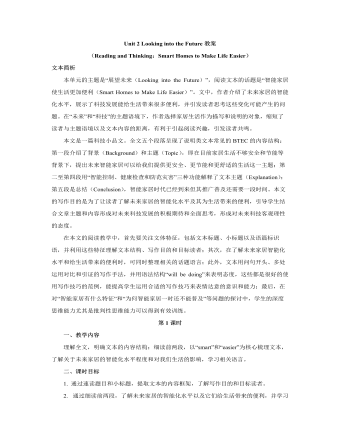
新人教版高中英语选修1Unit 2 Looking into the Future教案
【设计意图】以“新科技是一把双刃剑”为主题开展讨论活动。这个话题比较大,所以给了一定的限制,首先需要以智能家居为例来阐述科技发展对未来生活产生的影响,然后列举其优点和缺点,最后就以上现象发表自己的观点。这个活动是对整个文本的创意性总结与意义的升华,留给学生一定的想象空间,学生借此机会可以运用文本内容和语言表达自己对科技发展的看法和态度。Assignments:1. Finish Exercise 4 on Page 15 of the textbook.A smart home is one that integrated computers into the structure of the building itself. In this way, many of the things that we now do ourselves become automatic. For example, the smart home could control the air conditioning and lights so that you would no longer have to turn switches on and off, and so that your home would be more energy-efficient. The smart home could also monitor itself to make sure that everything is working as it should, and send you warnings if there is a problem. Such smart homes could even be programmed to detect your health problems, and then give you reasonable advice as to the food you should eat or if you should see a doctor. So, in a sense, smart homes will lead us to living smarter lives.2.Create a smart function for your home, and share your creation in the next period.
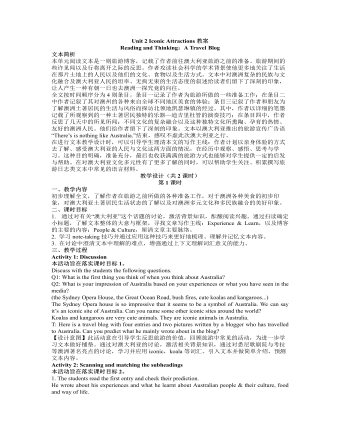
新人教版高中英语选修4Unit 2 Iconic Attractions教案
帮助学生通过讨论与对主题的提升,反思自己的旅游方式,以便做出更优化的安排,在今后的旅程中有更多的收益。 Activity 2: Further discussion of the 6 elements above and supplement of more background knowledge 本活动为实现课时教学目标2。 1.Target Q: The writer’s clear target of traveling, meeting the people and experiencing the culture, is closely related to his major in social studies. Then what is social studies? Social studies is a part of a school or college curriculum concerned with the study of social relationships and the functioning of society and usually made up of courses in history, government, economics, civics, sociology, geography, and anthropology. (Dictionary by Merriam-Webster) Reflection: When you go out to travel, what targets do you usually have in mind? 2.Research Q: Suppose you are traveling to Hangzhou during the school holidays, how will you do research on the city? (surf the internet, read books or travel brochures, consult friends, ...) What information will you be interested to know? (location, iconic sites, local cuisines, interesting customs, shopping malls ...) 3.Abandonment To make the most of time, we have to learn to abandon so that we can accomplish our plan. What will you be interested in doing if you go to Hangzhou if you have a week’s time? What if you only have 2 days? 4~5. Venturing & Experiencing Q: What did he venture to do during the trip? What new experiences did he have? In Sydney: attend his first open-air barbecue, enjoy many different but yummy meals In Catherine: observe the life and customs of the aborigines appreciate their music & try the musical instruments: the didgeridoo
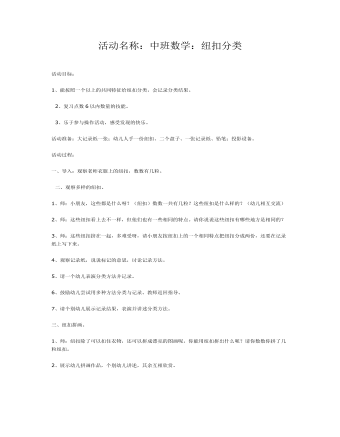
活动名称:中班数学:纽扣分类
2、复习点数6以内数量的技能。 3、乐于参与操作活动,感受发现的快乐。活动准备:大记录纸一张;幼儿人手一份纽扣、二个盘子、一张记录纸、铅笔;投影设备。活动过程:一、导入:观察老师衣服上的纽扣,数数有几粒。 二、观察多样的纽扣。1、师:小朋友,这些都是什么呀?(纽扣)数数一共有几粒?这些纽扣是什么样的?(幼儿相互交流)
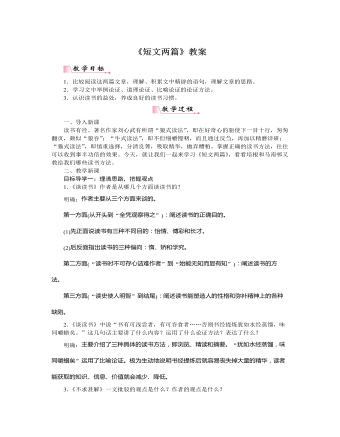
部编版语文九年级下册《短文两篇》教案
4.《不求甚解》一文分析了陶渊明怎样的读书态度,请指出“不求甚解”的两层含义。明确:态度:养成“好读书”的习惯;读书要诀在于“会意”。含义:第一,虚心,书不一定都能读懂;第二,读书方法:不固执一点,而要了解大意。5.《不求甚解》一文是驳论文还是立论文?又是如何驳或者立的?谈一谈你的理解。明确:驳论文。驳的是“论点”,先全面阐述“不求甚解”的含义,进而提倡虚心的“不求甚解”的读书态度,从而表明自己的观点;又从“会意”角度,列举古人读书的例子,并阐明自己的正确论点:读书在会意,不要死抠字眼,为一个局部而放弃整体;最后又强调了“书必须反复读”的主张。这样通过树立自己正确的观点从而驳倒敌论。
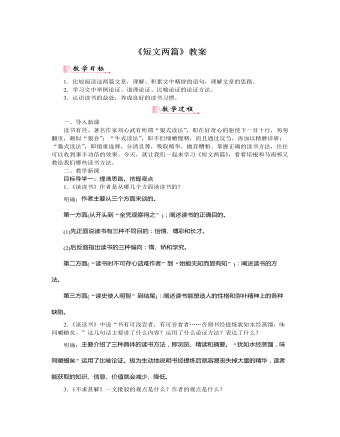
部编版语文九年级下册《短文两篇》教案
4.《不求甚解》一文分析了陶渊明怎样的读书态度,请指出“不求甚解”的两层含义。明确:态度:养成“好读书”的习惯;读书要诀在于“会意”。含义:第一,虚心,书不一定都能读懂;第二,读书方法:不固执一点,而要了解大意。5.《不求甚解》一文是驳论文还是立论文?又是如何驳或者立的?谈一谈你的理解。明确:驳论文。驳的是“论点”,先全面阐述“不求甚解”的含义,进而提倡虚心的“不求甚解”的读书态度,从而表明自己的观点;又从“会意”角度,列举古人读书的例子,并阐明自己的正确论点:读书在会意,不要死抠字眼,为一个局部而放弃整体;最后又强调了“书必须反复读”的主张。这样通过树立自己正确的观点从而驳倒敌论。
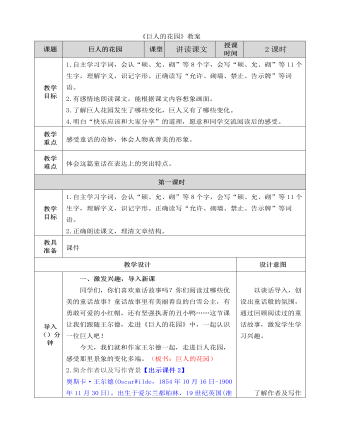
部编人教版四年级下册《 巨人的花园》教案
三、再读感知,理清结构1.学生大声朗读课文,想想:作者是分几个部分介绍巨人花园的?(三个部分)是按照什么顺序将材料串接起来的?(事情发展的顺序)哪些地方给你留下了深刻的印象?2.学生以小组为单位交流读后的收获,教师巡视指导。3.小组推荐一名同学汇报交流的结果,其他同学做补充。4.教师总结。【出示课件6】第一部分(1、2自然段):巨人回来前巨人花园可爱而快乐。第二部分(3-9自然段):巨人回来后驱赶孩童,花园充满凄凉和没有了生机。第三部分(10-15自然段):发现原因后,巨人欢迎孩子,花园又充满快乐。5.概括课文的主要内容。【出示课件7】(本文讲的是巨人回来前巨人花园漂亮而快乐。巨人回来后驱赶孩童,花园充满凄凉,没有了生机。当弄清原因后,巨人欢迎孩子,花园又充满快乐。)
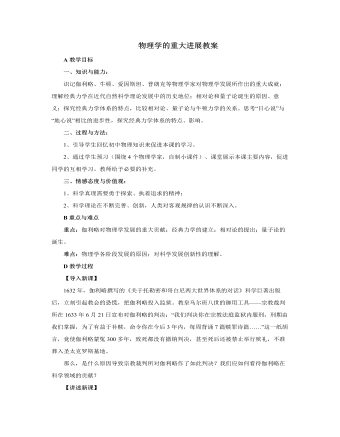
人教版高中历史必修3物理学的重大进展教案
B重点与难点重点:伽利略对物理学发展的重大贡献;经典力学的建立;相对论的提出;量子论的诞生。难点:物理学各阶段发展的原因;对科学发展创新性的理解。D教学过程【导入新课】1632年,伽利略撰写的《关于托勒密和哥白尼两大世界体系的对话》科学巨著出版后,立刻引起教会的恐慌,把伽利略投入监狱。教皇乌尔班八世的御用工具——宗教裁判所在1633年6月21日宣布对伽利略的判决:“我们判决你在宗教法庭监狱内服刑,刑期由我们掌握,为了有益于补赎,命令你在今后3年内,每周背诵7篇赎罪诗篇……”这一纸胡言,竟使伽利略蒙冤300多年,致死都没有撤销判决,甚至死后还被禁止举行殡礼,不准葬入圣太克罗斯墓地。那么,是什么原因导致宗教裁判所对伽利略作了如此判决?我们应如何看待伽利略在科学领域的贡献?
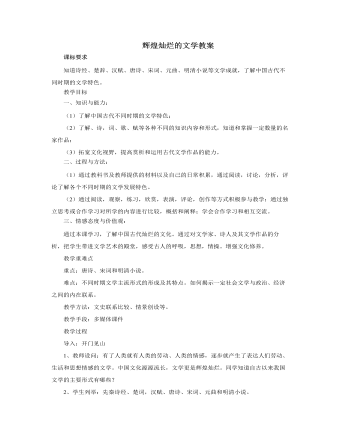
人教版高中历史必修3辉煌灿烂的文学教案
一、知识与能力:(1)了解中国古代不同时期的文学特色;(2)了解、诗,词、歌、赋等各种不同的知识内容和形式,知道和掌握一定数量的名家作品;(3)拓宽文化视野,提高赏析和运用古代文学作品的能力。二、过程与方法:(1)通过教科书及教师提供的材料以及自己的日常积累,通过阅读,讨论,分析,评论了解各个不同时期的文学发展特色。(2)通过阅读,观察,练习,欣赏,表演,评论,创作等方式积极参与教学;通过独立思考或合作学习对所学的内容进行比较,概括和阐释;学会合作学习和相互交流。三、情感态度与价值观:通过本课学习,了解中国古代灿烂的文化。通过对文学家、诗人及其文学作品的分析,把学生带进文学艺术的殿堂,感受古人的呼吸,思想,情操。增强文化修养。
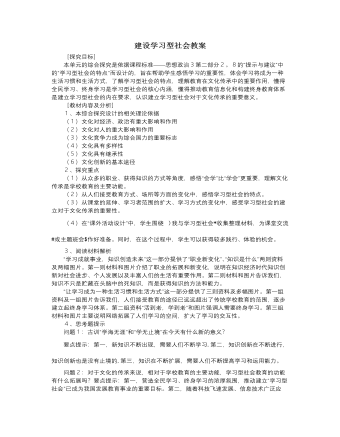
人教版高中政治必修3建设学习型社会教案
三、第三阶段。课后感悟与收获1、让学生以“走向学习型社会”为题,将在收集与整理、展示与交流两个环节中获得的体验和感悟,以心得体会的形式写一篇小论文。2、办一期专栏或黑板报,将优秀小论文作集中展示与交流。(进行理论总结,将实践与理论相结合,让科学理论更好地指导实践。充分挖掘学生潜力,增强学生的自信)[评析]新课程理念之一就是政治课不应只局限于课堂上的教与学。把综合探究课与研究性学习相结合,不失为一种有益的尝试。传统的学习方式把学习建立在客观性、受动性、依赖性的基础上,把学生看成一个没有感情的接受容器,这种学习会窒息学生的思维和智力,成为学生发展的障碍。单元探究活动的开展就是要转变学生的学习方式,关注学生的学习过程,使得探究过程成为学生发现问题、提出问题、分析问题、解决问题的过程,培养学生的创新精神和实践能力。本教案的第一阶段充分发挥了学生的主动性。
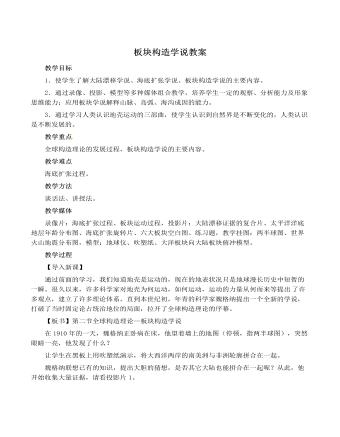
人教版高中地理选修1板块构造学说教案
【启发想象 】能否将刚才讲的内容用一个游泳动作形容一下?这好像蛙泳动作。我们大家一起做:熔岩冒出(双手合十向上)→推向两边(双手向两侧分开)→遇陆俯冲(双手往下)→重熔再生(双手相向合并向上)。【小结板书】二、海底扩张学说前面我们学习了两个假说,整理一下已知条件:事实证明大陆是在漂移的,如欧洲与美洲的距离在扩张,但是漂移的动力不足;海底是不断扩张的,有生长与消亡。能否在前人研究的基础上,提出更准确更合理的假设呢?一个新的理论诞生了,它是目前最盛行、最活跃的全球构造理论【板书】三、板块构造学说1.板块概念学生读书。【启发提问】板块“漂移”与大陆“漂移”的位置有何不同?学生回答。板块漂移是指岩石圈漂在软流层上,大陆漂移发生在地壳两层之间。【提问】板块是如何划分的?读图用半分钟记下六大板块的位置和名称(提示:按大洲和大洋名称记忆)。
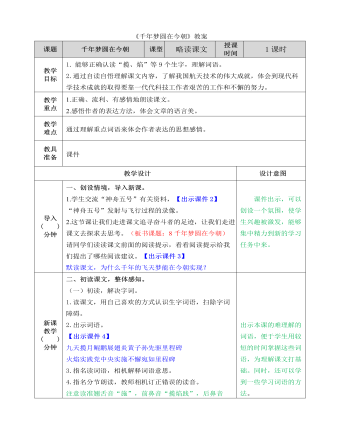
部编人教版四年级下册《 千年梦圆在今朝》教案
一、创设情境,导入新课。1.学生交流“神舟五号”有关资料,【出示课件2】“神舟五号”发射与飞行过程的录像。2.这节课让我们走进课文追寻奋斗者的足迹,让我们走进课文去探求去思考。(板书课题:8千年梦圆在今朝)请同学们读读课文前面的阅读提示,看看阅读提示给我们提出了哪些阅读建议。【出示课件3】默读课文,为什么千年的飞天梦能在今朝实现?二、初读课文,整体感知。(一)初读,解决字词。1.读课文,用自己喜欢的方式认识生字词语,扫除字词障碍。2.出示词语。
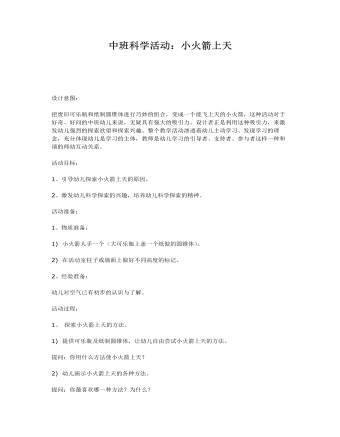
中班科学活动 《小火箭上天》课件教案
活动目标:1、引导幼儿探索小火箭上天的原因。2、激发幼儿科学探索的兴趣,培养幼儿科学探索的精神。活动准备:1、物质准备:1) 小火箭人手一个(大可乐瓶上盖一个纸做的圆锥体)。2) 在活动室柱子或墙面上做好不同高度的标记。

